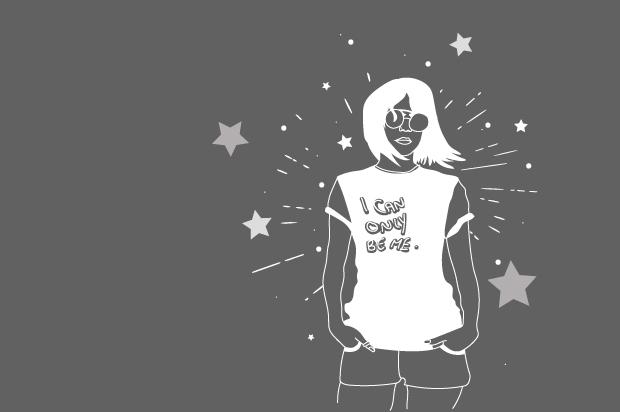I think I might be genderqueer
If you're questioning your gender identity it can be hard to explain how you're feeling or find support. Here at The Mix we look at what it means to be young and genderqueer and who you can turn to for help.

It's time to be proud of who you are.
Feeling confused about your gender? Like you’ve been born with the wrong body but don’t really know what body you’d feel most comfortable in? Putting a label on your gender isn’t straightforward, but what’s important is what your gender means to you and how you feel. Here are a few useful terms that can be helpful when talking about gender identity.
- Sex – biological sex is defined by our anatomy as male, female or intersex (those with different variations of sex characteristics, including chromosomes or genitals). It includes our internal and external sex organs, chromosomes and hormones.
- Gender – masculine or feminine characteristics that define you and represent how you see yourself. It’s often classed as being reinforced by society rather than biological sex.
- Transgender – an umbrella term used to describe people whose gender differs from the sex they’re born with.
- Genderqueer/non-binary – an umbrella term used to describe people who do not define themselves as either male or female.
- Cisgender – the opposite of transgender, where someone’s gender matches their birth sex.
- Pronoun – the word we use in place of a noun. In the case of defining gender, instead of ‘he’ or ‘she’ some genderqueer people may prefer to use a neutral term, such as ‘they’. It’s best to check with the individual on what they prefer.
- Misgender – to refer to someone using a term that does not correctly reflect the gender with which they identify.
What does it mean to be genderqueer?
Someone who defines themselves as genderqueer feels their gender identity does not fit into conventional gender distinctions associated with his/her biological sex. Instead, they identify with neither, both, or a combination of being a man and a woman. This is also known as non-binary and falls under the wider umbrella term of transgender.
How many genders are there?
According to Facebook, there are more than 70 ways of defining gender, but most application forms and questionnaires may only ask if you’re a man or a woman. However, gender is more of a spectrum that encompasses many different ways of ‘being’. These include male and female; those who do not feel they have a specific gender (agender or genderless); others who have a gender that’s in between (genderqueer, androgynous, third gender); and people whose gender changes (genderfluid).
Why is gender identity important?
Gender identity is important because when people are constantly misgendered it forces them to either have to hide their identity and never correct people, or constantly battle against people questioning who they are. There are no rules for expressing your gender. A genderqueer person may dress differently to the sex they were assigned at birth, but they also may not. If you’re unsure about a person’s identity, it’s best to ask and let them explain.
Understanding the many different gender identities that fall under the transgender umbrella is hard if you’re questioning your gender. Remember, identifying as genderqueer is about seeing gender in a different way, so it’s important to focus on what it means to you.
Getting support if you’re young and genderqueer
If you’re confused about your gender and need someone to talk there are many places you can go for support. Try these for starters…
- Gendered Intelligence aim to promote gender diversity and have various youth groups around the UK for non-binary and questioning young people.
- All About Trans focus on promoting a more sensitive and realistic representation of trans people in the media.
- Albert Kennedy Trust supports homeless LGBT 16- to 25-year-olds who’re made homeless or living in a hostile environment.
- Mermaids is a support group for trans people aged 19 and under. Their information line, tel: 020 8123 4819, is open Monday to Saturday from 3-7pm.
- LGBT Youth Scotland help young people in Scotland. It has loads of advice, as well as a text and live chat service for those struggling with trans issues. They also have a great leaflet about coming out as trans.
- The Mix has an online community where you can chat anonymously to other young people about how you’re feeling.
Next Steps
- Queer Youth Network gives you the opportunity to meet and chat with other LGBT young people online.
- LGBT Youth Scotland has lots of great advice articles about LGBT issues, as well as running supportive live chats online. Text on 07786 202 370.
- Chat about this subject on our Discussion Boards.
- Need help but confused where to go locally? Download our StepFinder iPhone app to find local support services quickly.
By
Updated on 25-Feb-2016
Photo by Shutterstock.
No featured article














